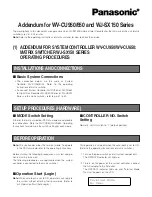
245
Step
Command
Remarks
3.
Configure BGP route
distribution filtering policies.
•
Reference an ACL or IPv6
prefix list to filter advertised
BGP routes:
filter-policy
{
ipv6-acl-number
|
prefix-list
ipv6-prefix-name
}
export
[
direct
|
isisv6
process-id
|
ospfv3
process-id
|
ripng
process-id
|
static
]
•
Reference a routing policy to
filter BGP routes advertised
to a peer or peer group:
peer
{
group-name
|
ipv6-address
[
prefix-length
] }
route-policy
route-policy-name
export
•
Reference an ACL to filter
BGP routes advertised to a
peer or peer group:
peer
{
group-name
|
ipv6-address
[
prefix-length
] }
filter-policy
ipv6-acl-number
export
•
Reference an AS path list to
filter BGP routes advertised
to a peer or peer group:
peer
{
group-name
|
ipv6-address
[
prefix-length
] }
as-path-acl
as-path-acl-number
export
•
Reference an IPv6 prefix list
to filter BGP routes
advertised to a peer or peer
group
peer
{
group-name
|
ipv6-address
[
prefix-length
] }
prefix-list
ipv6-prefix-name
export
Use at least one method.
By default, no BGP distribution
filtering policy is configured.
Configuring BGP route reception filtering policies
You can use the following methods to configure BGP route reception filtering policies:
•
Use an ACL or prefix list to filter routing information received from all peers.
•
Use a routing policy, ACL, AS path list, or prefix list to filter routing information received from a
peer or peer group.
If you configure multiple filtering policies, apply them in the following sequence:
1.
filter-policy import
2.
peer filter-policy import
3.
peer as-path-acl import
4.
peer prefix-list import
5.
peer route-policy import
Only routes passing all the configured policies can be received.
To configure BGP route reception filtering policies (IPv4 unicast/multicast address family):
Summary of Contents for HPE FlexNetwork 7500 series
Page 505: ...493 Connector N A ...
















































